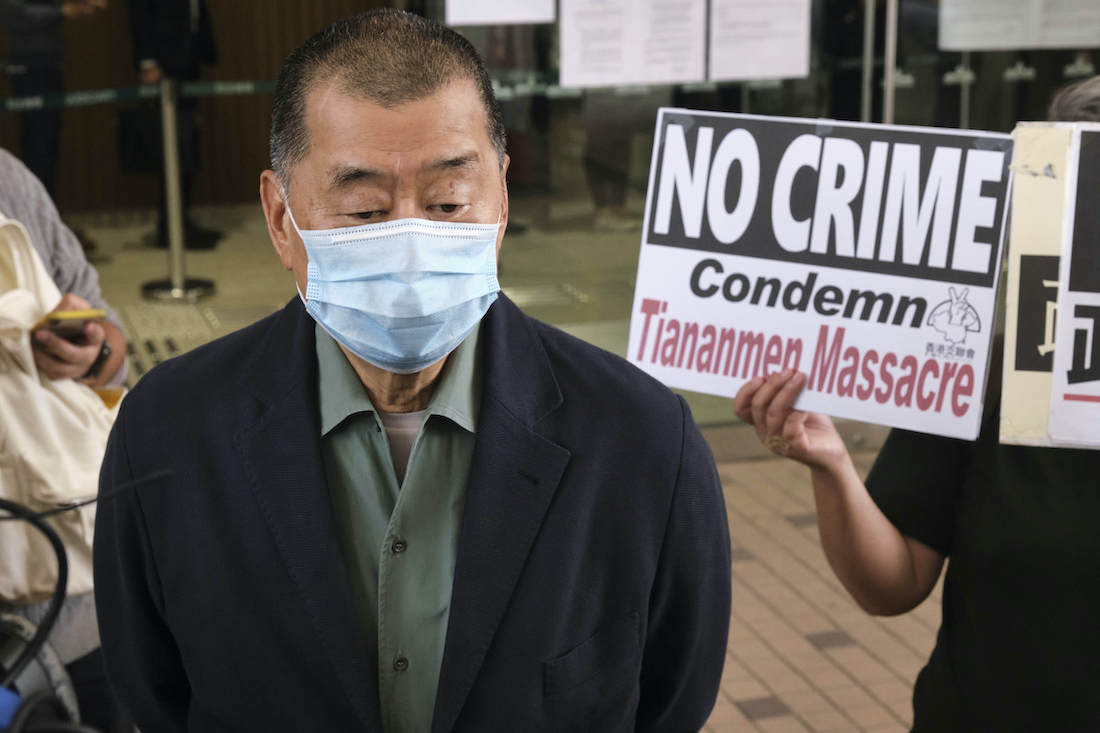Jimmy Lai, the outspoken Catholic dissident who has dedicated his Hong Kong-based media empire to exposing Chinese repression, has been arrested on new charges and ordered to spend the next four months in jail. If convicted, Lai – who received the Acton Institute’s 2020 Faith and Freedom Award two weeks ago – as well as two of his associates face up to 14 years in prison.
Authorities rounded up the men and pressed new charges during a hearing at the West Kowloon Court on Thursday. Police accuse Lai, his company’s chief operating officer Royston Chow Tat-kuen, and chief administrative officer Wong Wai-keung of fraud. Their alleged crime? Subleasing office space at Apple Daily Printing Limited to Dico Consultants Limited from June 2016 until this May. Hong Kong police claim that violates the terms of Apple’s lease with the Hong Kong Science and Technology Parks Corporation, a public corporation.
Chief Magistrate Victor So Wai-tak let Lai’s associates go, setting Chow’s bail at HK$200,000 ($25,800 U.S.) and Wong’s at HK$100,000 ($12,900 U.S.).
But the judge, whom Hong Kong’s titular leader Carrie Lam personally selected to hear national security cases, deemed Lai a flight risk and denied him bail.
The magistrate then scheduled Lai’s next hearing for April 16, 2021 – essentially ordering the septuagenarian to spend more than four months in prison.
Lai, Chow, and Wong – executives of Next Digital, which publishes the pro-democracy newspaper Apple Daily – may have become accustomed to encounters with the police. More than 200 police officers stormed their offices on August 10 to arrest the three men, and two of Lai’s sons, for allegedly breaking China’s newly enacted “national security law.” The ordinance allows the People’s Republic of China to establish police units in Hong Kong and to punish ill-defined acts of “secession, subversion, or terrorism.”
If convicted, the men face life in prison.
Citizens of the Special Administrative Region say the law gives Beijing carte blanche to crack down on those who seek restore Hong Kong’s liberty.
“This is about dirtying Jimmy up,” said Mark Simon, one of Lai’s associates. “It’s Beijing’s policing brought to Hong Kong.”
A judge had already acquitted Lai of trumped-up charges of intimidating a reporter from a rival newspaper in September. Lai said the reporter had stalked and harassed him. Lai faced five years in prison in that case.
Police arrested Lai two other times this year, in February and April, for participating in protests. Government officers raided his business offices in October, seeking material for today’s charges.
The arrests came the same day authorities sentenced three other pro-democracy leaders – Ivan Lam, Agnes Chow, and Joshua Wong – to jail for protesting outside police headquarters last June. They received 7, 10, and 13-and-a-half months in prison, respectively.
“China was sending a clear message: If you oppose us anywhere in the world, we will crush you,” stated an unsigned editorial in the Wall Street Journal. “In Mr. Lai’s case the decision to arrest him over the terms of a business lease sends the additional message that any charges will do.”
However, the national security law offers the greatest leverage to put the publisher of Hong Kong’s most outspoken – and most popular – dissident publication away for good.
The Tiananmen Square massacre steeled Lai’s resolve to publicize the crimes of the Chinese Communist Party. “He has a home in Paris,” said Lai’s godfather, Wall Street Journal editor Bill McGurn. “He could live anywhere in the world.” Yet Lai has steadfastly refused to leave Hong Kong, where he emigrated, alone and penniless, as a child.
At the same time, the faithful Catholic has espoused the need for China to ground its policy on sound moral footing. “Without assimilating into Western values, there won’t be peace in international trade, politics and diplomacy,” he said. “If we don’t change [China], the world will not have peace.”
To human eyes, the possibility seems remote. The CCP persecutes Chinese Christians alongside Uighur Muslims, Tibetan Buddhists, the Falun Gong, and any religious movement that posits a deity higher than the omnipotent state. But experts believe China already has as many or more Christians than members of the Chinese Communist Party. And Fenggang Yang of Purdue University believes China will have more Christians than any other nation by 2030.
Chinese officials have accused Lai of colluding with foreign powers out of fear his message will stir the still-swirling discontent of Hong Kongers outraged by Beijing’s abrogation of its “one country, two systems” policy, which was supposed to last until 2047. Specifically addressing Lai, the Hong Kong and Macao Affairs Office issued a statement saying that “Hong Kong will not have stability if this danger is not removed.”
For his voluntary suffering in the name of liberty, the Acton Institute bestowed its 2020 Faith and Freedom Award on Jimmy Lai at our 30th anniversary gala on November 18. He vowed to persevere, knowing full well that “freedom has a price.” Lai, a self-made billionaire, thanked the Roman Catholic Church and Friedrich von Hayek for his intellectual formation.
Yet Pope Francis – who penned an op-ed in the New York Times on Thanksgiving denouncing those who turn “personal freedom” into “a prism through which they see everything” – has yet to comment on Lai’s case. The pontiff announced a two-year extension of the Vatican’s deal with China in late October.
The pope is not the only one whose resolve is being tested. The Wall Street Journal surmises that Joe Biden faces a contrived crisis like the one Biden (accurately) predicted would greet the incoming Obama administration. “Chinese leader Xi Jinping … is testing whether a Biden Administration – especially one seeking a climate accord – will look the other way on China’s behavior in Hong Kong and elsewhere.”
Our prayers go with Jimmy Lai – and with those who have the power to demand that China release him and all prisoners of conscience.

